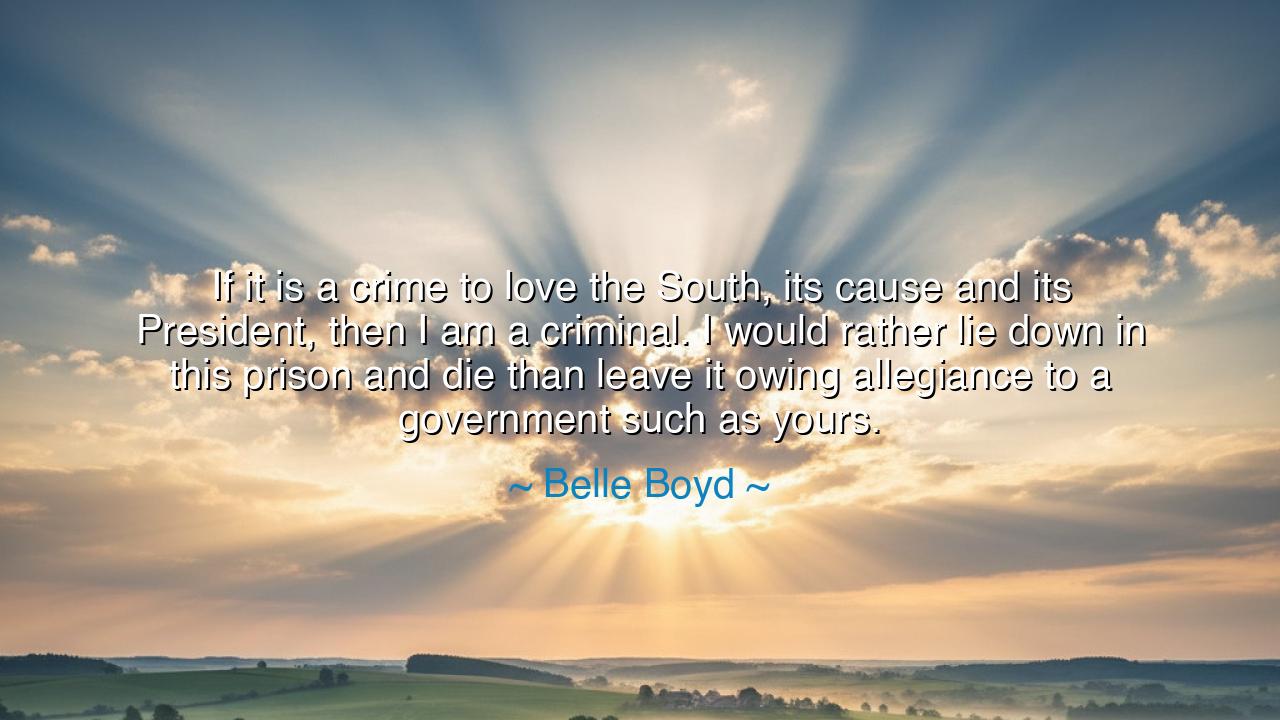
If it is a crime to love the South, its cause and its President
If it is a crime to love the South, its cause and its President, then I am a criminal. I would rather lie down in this prison and die than leave it owing allegiance to a government such as yours.






"If it is a crime to love the South, its cause and its President, then I am a criminal. I would rather lie down in this prison and die than leave it owing allegiance to a government such as yours." – Belle Boyd
In these fierce and defiant words, Belle Boyd, the famed Confederate spy of the American Civil War, speaks with the fire of conviction and the unbending spirit of loyalty. Her declaration is not merely an act of rebellion—it is an oath of identity, sworn from the depths of her being. When she says, “If it is a crime to love the South…”, she transforms love itself into an act of resistance. Her voice trembles not with fear, but with pride, proclaiming that allegiance to conscience is greater than obedience to power. To her, honor and fidelity were worth more than life itself, and a death in chains was preferable to freedom purchased with betrayal.
The origin of this quote lies in the tumultuous years of the Civil War, when the United States was torn asunder by conflicting visions of liberty, sovereignty, and justice. Born in Virginia in 1844, Belle Boyd was no soldier, yet she wielded courage as her weapon. Still in her teens, she became one of the most notorious spies for the Confederacy, gathering intelligence for the Southern army at great personal risk. Captured multiple times by Union forces, she refused to repent or deny her cause. It was during one of these imprisonments that she uttered her immortal words—words that distilled the essence of her faith in the Southern cause, her loyalty to President Jefferson Davis, and her disdain for a government she viewed as oppressive.
In spirit, Belle Boyd’s defiance echoes the ancient code of those who value principle above survival. Her stance recalls Socrates, who chose to drink the hemlock rather than betray his beliefs, and Joan of Arc, who faced fire rather than renounce her divine mission. Like them, Boyd saw conviction as sacred—something not to be bartered for comfort or safety. She represents that eternal class of souls who, when confronted with tyranny or judgment, declare that the conscience of the heart is higher than the command of the state. Her words remind us that even the powerless may possess a power greater than armies: the power of unwavering belief.
And yet, her statement also reveals the tragedy of division that lay at the heart of the American conflict. For while her courage was undeniable, her allegiance was bound to a cause that history would come to judge harshly—the preservation of a system entwined with slavery. Thus her words, though noble in tone, also serve as a mirror of moral complexity. They show how love for one’s homeland can become entangled with blindness to its wrongs. In her mind, she fought for freedom and independence; in the broader sweep of history, her cause stood in opposition to the liberty of others. Here lies the painful paradox of patriotism: when devotion to one’s land becomes deaf to the universal call of justice.
Still, there is a universal truth shining through her defiance—the idea that true conviction demands sacrifice. Whether one agrees with her cause or not, her words speak to the enduring human struggle between obedience and integrity, between the safety of silence and the peril of truth. Every age produces its own Belle Boyds—those who refuse to bow, who would rather face ruin than forsake the ideals that define them. And though history may not always vindicate their beliefs, it remembers their courage, for courage itself is a kind of immortality.
Her declaration also serves as a warning to every government and generation: that when rulers drift too far from the hearts of their people, rebellion is born not from hatred, but from love—a love betrayed. The state exists to serve conscience, not to command it. When authority grows arrogant, when it punishes faith and principle as crimes, it sows the seeds of its own undoing. Boyd’s prison cell thus becomes symbolic of a greater truth: that the human spirit cannot be imprisoned, for even behind bars, the heart may still stand free.
The lesson, then, is this: love your homeland, but love truth even more. Defend your principles, but let your conscience be guided not only by passion, but by justice and compassion alike. In every conflict—whether of nations or of souls—ask not only, “Whom do I serve?” but “What do I serve?” For love without wisdom becomes fanaticism, and conviction without mercy becomes cruelty.
So let Belle Boyd’s fiery words remind us of the sacred balance between devotion and discernment, between loyalty and moral vision. To live rightly is to find the courage to stand for what one believes—yet also the humility to ask whether that belief serves the greater good. For in the end, the highest allegiance any soul can give is not to a flag or a government, but to truth, justice, and the better angels of our shared humanity.






AAdministratorAdministrator
Welcome, honored guests. Please leave a comment, we will respond soon